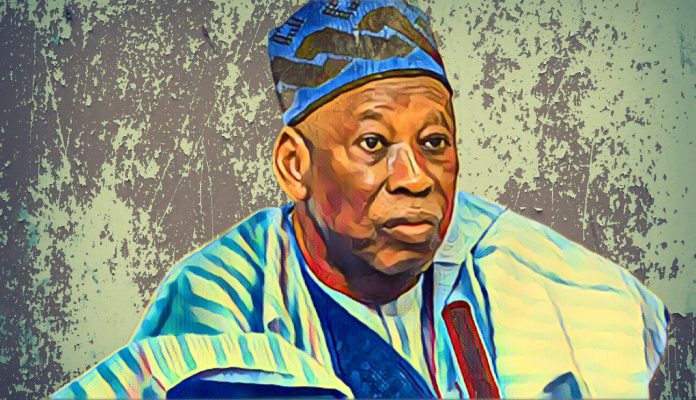In Kano State, Nigeria, the All Progressives Congress (APC) is currently facing a severe internal crisis. There are multiple factions claiming legitimacy in the Ganduje ward of Dawakin-Tofa local government area, which has led to the repeated suspension of Dr. Abdullahi Umar Ganduje, the national chairman of the party and former governor of the state. This situation is similar to the factional conflicts that led to the removal of Adams Oshiomhole as the APC national chairman in 2020. This crisis poses significant challenges to the party’s cohesion and stability as it prepares for the 2027 elections.
The crisis began when a group of 11 individuals, led by Haladu Gwanjo, announced Ganduje’s suspension over allegations of corruption linked to the state government. Shortly thereafter, a counter-group of 25, led by Ahmad Mohammed, emerged, dismissing the legitimacy of the initial suspension and claiming to be the true representatives of the Ganduje ward. This group labeled the G-11 as impostors, a claim that has further deepened the division within the party.
A state court order affirmed Ganduje’s suspension, which escalated the ongoing factional battle within the party. This development is likely to result in further legal battles and intra-party conflict. The situation is complicated by speculation of political maneuvering at the national level. Some accuse the presidency of exploiting Ganduje’s troubles to form alliances with other significant political figures in Kano, such as Dr. Rabiu Kwankwaso of the New National People’s Party (NNPP).
In the midst of these tensions, a third group claiming to be the duly elected ward executives from the 2021 election has emerged. This group, represented by Ja’afar Adamu Ganduje, who is also Ganduje’s nephew, has announced a fresh suspension of Ganduje. They accuse him of creating a conflict of interest that led to the fragmentation of the ward’s executive committee and the party’s poor performance in recent elections. They also cite his alleged involvement in anti-party activities and his divisive influence in local politics.
The group led by Ahmad Mohammed has responded to competing groups’ claims by urging the public and party members to disregard them. They asserted that there have been no new elections that would change the leadership established under his chairmanship. This group has called for the intervention of national party authorities and security agencies to address the issue of impersonation in the ward and restore order.
The ongoing disputes have caught the attention of the Coalition of United Political Parties (CUPP), which has expressed concerns about attempts by the APC to manipulate the executive lists recognized by the Independent National Electoral Commission (INEC). CUPP has warned against any changes that could destabilize the political landscape in Kano State. They emphasized the need for INEC to maintain its current records to prevent further confusion and conflict.
The leadership of the APC in Kano has threatened legal action against members of the factions that have issued suspensions against Ganduje. They have been labeled as impersonators being manipulated by political adversaries to tarnish Ganduje’s image. The state Public Relations Officer of APC, Ahmad Aruwa, has confirmed that the party is taking the matter seriously and will pursue legal measures to resolve the factional disputes.
Additionally, Oliver Okpala, the Senior Special Assistant to the APC National Chairman on Public Enlightenment, has condemned the actions of those defying court orders regarding Ganduje’s suspension. Okpala emphasized the seriousness of contempt for judicial authority and hinted at the possibility of legal consequences for those involved in perpetuating the factional splits within the party.
The internal strife within the APC’s Ganduje ward is indicative of broader challenges facing the party. It is grappling with issues of leadership legitimacy, legal battles, and potential political realignments ahead of the 2027 elections. The situation in Kano underscores the importance of legal and democratic processes in resolving internal disputes and highlights the intricate interplay of local party dynamics and national political strategies.
As the APC navigates these turbulent waters, the outcome of this crisis will likely have significant implications for its structural integrity and electoral prospects in the coming years.



